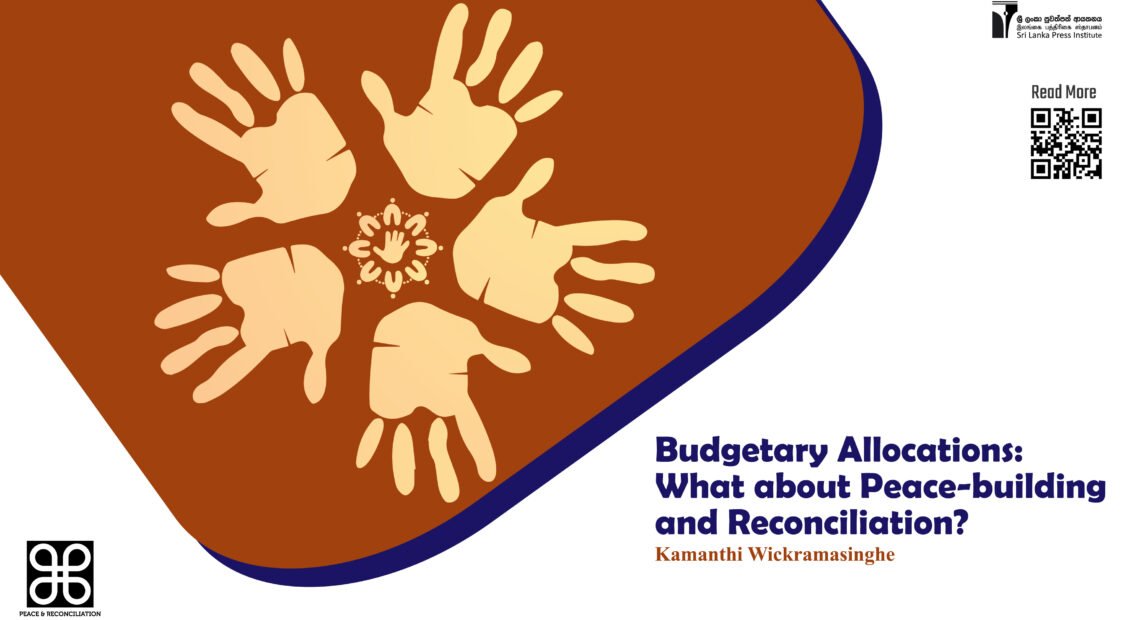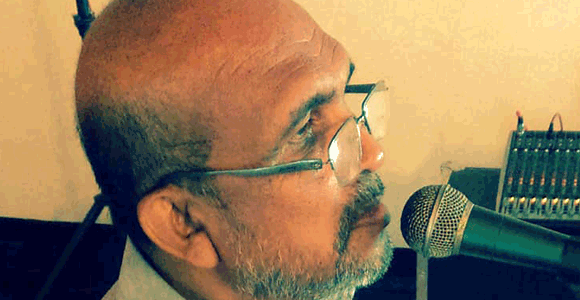
Budgetary Allocations: What about Peace-building and Reconciliation?
Kamanthi Wickramasinghe
Located in the heart of Kilinochchi is an eatery, with around a dozen women preparing various delicacies unique to the Northern parts of Sri Lanka. From milk hoppers to ghee thosai and snacks made of gram flour, porridge, fresh juices and many other items are prepared here at affordable rates. This is what we encountered when we went to ‘Ammachchi’, a livelihood development project for women affected by the war.
‘Ammachchi’ was selected for inclusion in the United Nations Development Programme’s Agro Economic Development project. The first outlet was established in Vavuniya and with the growing demand for traditional food it later expanded to Mullaitivu, Jaffna, Kilinochchi as well as towards the interiors in the Northern Province, giving a ray of hope for women who were the sole breadwinners of their families. This was one of many programmes that were introduced to support the reconciliation process in Sri Lanka. Additionally, former LTTE cadres are also being rehabilitated within the project in order to reintegrate them back into society, with the assistance of the tri-forces. Some are farmers, others are developing their own businesses and are slowly adjusting to a new life.
But what is the future of the transitional justice process in Sri Lanka?
Uthuru Wasanthaya and Negenahira Navodaya
During the Mahinda Rajapaksa regime, programmes such as ‘Uthuru Wasanthaya’ under his Mahinda Chinthanaya manifesto were aimed at developing the war-torn North into a land of prosperity. As soon as the Eastern province was freed from the clutches of terrorists all three districts of the Province were restored under the ‘Negenahira Navodaya’ programme. The ‘Uthuru Wasanthaya’ programme was a mega-development drive to develop the five districts – Jaffna, Kilinochchi, Mullaitivu, Vavuniya and Mannar. From 2006-2011 Rs. 425 billion was allocated for these development programmes. The money was spent on resettlement programmes, de-mining, reconstruction of destroyed infrastructure facilities such as water tanks, renovating schools, housing projects and other welfare activities. The two programmes were also aimed at improving economic infrastructure and giving financial security to victims of the war.
The immediate focus on recovery, reconstruction and rehabilitation boosted the Northern Province’s economic growth rate between 2010 and 2012. A 2013 Finance Ministry Annual Report recorded that the Northern Province had a Provincial GDP of 25.9% in 2012 contributing 4.0% to the national economy – an increase from 3.4% in 2010. This was mainly due to the resumption of economic activity in the agricultural sector involving 60% of the population following de-mining, land release and removal of coastline fishing restrictions. However, after 2012, the Provincial growth rate slowed down. As of 2017, the Northern Province was host to the lowest number of industrial enterprises. As per the records in a 2017 Central Bank Annual Report, out of 5332 industrial enterprises situated across the country, only 34 are found in the Northern Province. Deeper examination of the causes for the shortfall in development outcomes show that important macroeconomic features and specific socio-economic challenges weren’t adequately included during policy formulation.
Supporting the UNHRC Resolution
Although mega-scale development projects took place, the human rights aspect wasn’t taken seriously. Many were awaiting justice. Alleged issues pertaining to disappearances kept interest groups pushing the government to launch investigations. In fact it was during the Yahapalana regime that ‘transitional justice’ was highlighted as a serious issue that needs to be addressed.
According to the United Nations (UN), transitional justice is an approach to systematic or massive violations of human rights that both provides redress for victims and creates or enhances opportunities for the transformation of political systems, conflicts and other conditions that may have been at the root of abuses.
In its resolution A/HRC/25/1, adopted in March 2014 on ‘Promoting reconciliation, accountability and human rights in Sri Lanka’ the UNHRC requested the UN Commissioner for Human Rights to launch a comprehensive investigation on the alleged serious violations and abuses on human rights and related crimes by both parties in Sri Lanka during the period covered by the Lessons Learnt and Reconciliation Commission (LLRC) from February 2002 to November 2011, thereby establishing the facts and circumstances of such alleged violations of the crimes perpetrated with a view to avoiding impunity and assisting accountability, with assistance from relevant experts and special procedure mandate holders.
Subsequently, in 2015, the then government of Sri Lanka co-sponsored the landmark UNHRC resolution, 30/1. This committed the country to a transitional justice process that promised to establish mechanisms to deliver truth, justice, reparations, and guarantees of non-recurrence. The government renewed these commitments in two further UNHRC resolutions in 2017 and 2019, but had only made modest progress in delivering these commitments.
Subsequently, the Office on Missing Persons (OMP) and the Office on Reparations were permanent offices set up by legislation in 2016 and 2018 respectively by the then government to fulfill the commitments in the UNHRC resolution. The Office of Missing Persons Act No. 14 of 2016 was also enacted in 2016. The objectives of the OMP were to provide appropriate mechanisms to trace missing persons and to clarify circumstances in which such persons went missing and their fate, make recommendations to relevant authorities on reducing such incidents among others.
When referring to OMP’s interim report submitted to the then President Maithripala Sirisena in 2018, it is understood that operationalizing offices, including designing and setting up of district level offices was one of the primary objectives. The OMP has also conducted public consultations with families of meetings and held confidential meetings when requested by affected families. At the time, the OMP was also involved in conducting inquiries on specific cases such as supporting excavation and exhumation of a mass grave in Mannar. One of the major challenges it faced was that families of victims lacked trust towards the State and by extension, the OMP and therefore recognized the importance in securing trust.
Budgetary allocations and future of transitional justice
Prior to 2015, peace-building support was mainly focused on humanitarian and early recovery interventions such as those aimed at revitalizing the economy through livelihood and economic development, generating immediate peace dividends through support for resettlement and re-establishing essential administrative services in the North and East. As per official data included in the World Bank’s Draft Country Partnership Framework (2016) Sri Lanka received approx. USD 5.8 billion in aid in 2014.
Back in 2018, the Yahapalana government allocated Rs. 12.75 billion to develop the economy in the North and East, and address the issues of people. Allocations were separated for the Office of Missing Persons, infrastructure development such as Achchuveli Industrial Zone, facilitating the ‘Ammachchi’ concept to empower women to engage in small businesses, implement a low interest loan scheme for those who are in debt ,developing the Myliddy Fisheries Harbour and resettling internally displaced Muslim families that were forcibly displaced during the war among other programmes.
Unemployment is a serious concern in the North where many youth are skilled in various vocations but don’t have jobs. They don’t have the means to travel to the South for job opportunities. Training women to make ornaments with palmyrah products for instance would have opened more opportunities for them, allowing them to penetrate into the high scale fashion market. People in the North were also falling into the microfinance trap and allocating low interest loan schemes that would have given them some sort of relief.
Prior to the 2021 Budget reading, Amnesty International, a global movement to end abuses on human rights called on the government to remain committed to delivering truth, justice and reparations to those affected by the war. With the government withdrawing from the UN Human Rights Council back in February, Amnesty International expressed concerns about cutting down allocations for the Office of Missing Persons and Office of Reparations. By slashing budgets, it will affect the limited gains achieved by these two bodies and victims seeking the truth.
However, the 2021 Budget proposal seems to have ignored allocating funds for peace-building and reconciliation, thereby raising concerns about the future of the transitional justice process in Sri Lanka.







